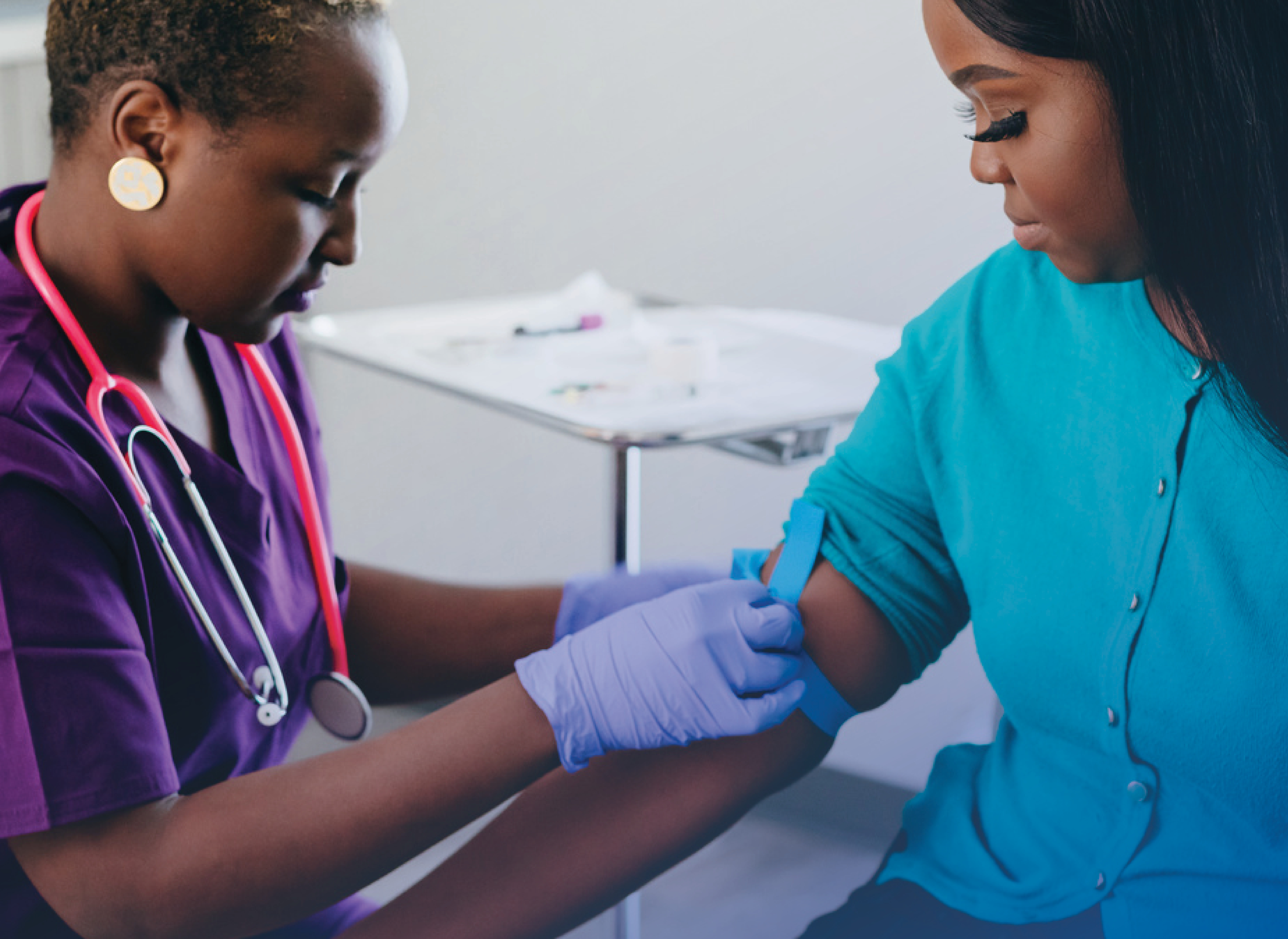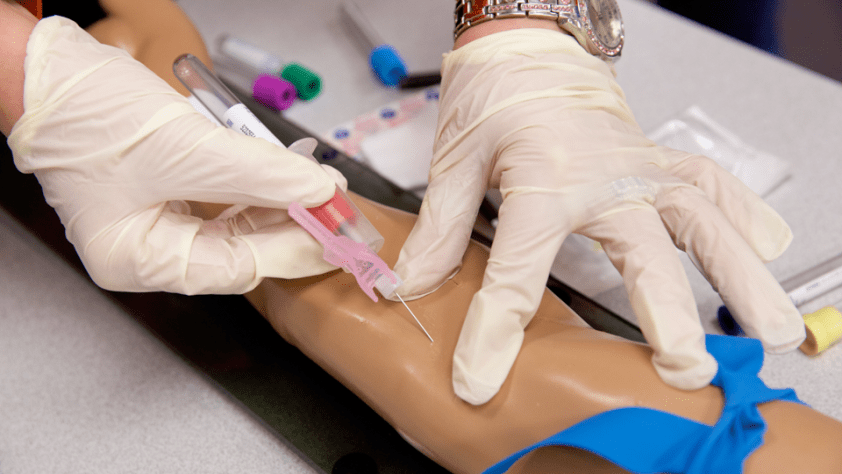How Phlebotomy Courses Near Me Can Fast-Track Your Entry into the Healthcare Field
How Phlebotomy Courses Near Me Can Fast-Track Your Entry into the Healthcare Field
Blog Article
The Path to Certification: Comprehending the Phlebotomy Training Course Trip and Its Value
As you take into consideration the path to certification in phlebotomy, it's important to understand the role you'll play in healthcare. Your training will certainly cover important abilities, from blood collection methods to patient interaction. Each element of the program prepares you for the difficulties ahead. What specifically does the trip involve, and why is certification so essential for your future occupation? Allow's discover these questions even more.

The Duty of Phlebotomists in Health Care
Phlebotomists play an important duty in the health care system, acting as the crucial link in between patients and crucial diagnostic testing. You'll perform blood draws, ensuring samples are accumulated precisely and securely. Your competence helps in identifying clinical problems, checking wellness, and leading treatment decisions.
In your daily communications, you'll require to develop trust fund with individuals, making them feel comfortable during what could be a stressful experience. You're accountable for identifying and taking care of samples very carefully to avoid contamination or errors, which might influence test results.
Past this, you'll usually function along with medical professionals and registered nurses, connecting critical details concerning people' conditions. By mastering your skills, you add meaningfully to patient treatment, making you an indispensable component of the clinical group.
Introduction of Phlebotomy Training Programs
When checking out phlebotomy training programs, you'll locate numerous types made to fit different schedules and learning styles. Each program helps you develop crucial abilities like blood collection and person communication. Comprehending these choices is key to picking the appropriate path for your career.
Kinds Of Educating Programs
A number of types of training programs are readily available for those looking to become proficient in phlebotomy. Furthermore, some hospitals and clinics use on-the-job training programs, providing functional experience while you learn. Whatever course you pick, each program aims to outfit you with the necessary skills for an effective phlebotomy career.

Key Abilities Created
Mastering phlebotomy requires a set of essential skills that are established with complete training programs. You'll find out technological abilities like appropriate capillary option, needle insertion, and blood collection techniques. These hands-on practices guarantee you can perform treatments securely and successfully. In addition, communication skills are essential; you'll need to communicate with clients, discuss procedures, and placed them at convenience. Recognizing makeup and physiology is essential, also, as it helps you find veins and understand the body's response to blood attracts. Ultimately, you'll acquire knowledge of security protocols and infection control, assuring you maintain a clean and sterile setting. Each of these abilities is crucial for your success as a qualified phlebotomist, making you an important asset in any kind of health care setup.
Secret Elements of a Phlebotomy Course
In a phlebotomy program, you'll concentrate on necessary topics that prepared for your future job. You'll take part in hands-on training that enables you to use what you've discovered in real-world setups. Both the curriculum and functional experience are vital for your success as a phlebotomist.
Curriculum Overview
While pursuing a phlebotomy training program, you'll encounter a curriculum created to outfit you with fundamental skills and understanding. Phlebotomy school. This educational program generally includes composition and physiology, concentrating on the blood circulation system and understanding blood components. You'll likewise learn more about various sorts of blood collection methods, including venipuncture and capillary leak methods
Furthermore, infection control and safety and security methods are vital parts, guaranteeing you understand just how to maintain a sterile setting. You'll study patient interaction, stressing communication and compassion, which are essential for reducing client anxiousness. Finally, moral and legal considerations will certainly be resolved, preparing you for real-world duties. This foundational expertise will allow you to stand out as a phlebotomist and offer quality care in professional settings.
Hands-On Training Experience
Getting hands-on experience is an essential part of your phlebotomy training program. This functional training permits you to use what you've discovered in a real-world setting, improving your skills and self-confidence. You'll practice venipuncture techniques, learn exactly how to manage different sorts of specimens, and obtain knowledgeable about the tools utilized in the field. Under the support of skilled teachers, you'll refine your abilities, guaranteeing you're prepared for any kind of situation you might deal browse around these guys with.
In addition, you'll get the possibility to communicate with people, which is important for creating your communication skills. This mix of technological proficiency and interpersonal abilities is critical for your success as a licensed phlebotomist. Ultimately, hands-on training is where theory satisfies technique, strengthening your knowledge and readiness for qualification.
Qualification and Licensing Requirements
Before you can begin your job in phlebotomy, it is essential to recognize the certification and licensing needs that vary by state. The majority of states require phlebotomists to hold an accreditation from an identified company, such as the National Phlebotomy Organization or the American Culture for Scientific Pathology. These accreditations generally include passing an examination that checks your expertise and abilities in the area.
In enhancement to certification, some states have specific licensing demands. You might need to finish a particular number of hours in clinical technique, submit evidence of training, or undertake a history check. It is essential to investigate your state's regulations to see to it you meet all essential criteria.
Remaining notified regarding these demands not only assists you secure a position but additionally boosts your reliability as a professional. By fulfilling these demands, you'll be well on your method to a successful career in phlebotomy.
Hands-On Training and Practical Experience
Hands-on training and practical experience are important components of your phlebotomy education and learning, as they enable you to apply theoretical expertise in real-world scenarios. During your training, you'll take part in monitored venipuncture, discover appropriate techniques, and come to be knowledgeable about different blood collection tools. This straight involvement is important for developing your confidence and sharpening your abilities.
You'll work very closely with knowledgeable experts that can assist you with the subtleties of individual communication and example handling. Each practice session not just enhances your understanding but also prepares you for the busy environment of medical care settings.
In addition, lots of programs integrate professional rotations, permitting you to experience diverse setups, from health centers to outpatient clinics. This direct exposure assists you adjust to different obstacles and client demands, ensuring you're well-prepared for your future role. Accept these possibilities, as they're vital to becoming an experienced and compassionate phlebotomist.
Obstacles Faced Throughout Training
While acquiring hands-on experience is crucial, it is necessary to recognize the challenges that can develop during your phlebotomy training. You may encounter stress and anxiety when performing treatments on real clients, specifically if you're new to the environment. The pressure to obtain every little thing right can be overwhelming. Furthermore, understanding the abilities required for blood draws takes method; you might have problem with technique at first.
Time administration can likewise be a difficulty, as harmonizing concept, practical sessions, and personal dedications can feel intimidating. You may face varying discovering speeds amongst your have a peek at this site peers, causing sensations of insecurity if you think you're falling back. Lastly, adapting to the different individualities of instructors can be tough, as each might have an unique teaching design.
Identifying these barriers beforehand can prepare you for success and aid you establish durability throughout your training journey.
Profession Opportunities After Certification

As you obtain experience, you might even think about focusing on locations like pediatric or geriatric phlebotomy, accommodating certain client demands. Some phlebotomists choose to advance their professions by ending up being research laboratory technicians or seeking more education in medical care fields.
Additionally, your qualification can cause duties in training or managing new phlebotomists, allowing you to share your understanding. With the health care sector constantly growing, your abilities will certainly constantly remain in demand, leading the way for a secure and meeting profession. Welcome the opportunities waiting for you!
Often Asked Concerns
What Is the Normal Period of a Phlebotomy Educating Training Course?
Phlebotomy training programs usually last around 4 to 8 weeks. You'll involve in hands-on technique, class guideline, and on-line learning. Completing this training prepares you for certification and Our site a gratifying occupation in health care.
Are Online Phlebotomy Courses Available?
Yes, on-line phlebotomy training courses are readily available. They supply adaptability and ease, permitting you to research at your very own rate. Simply confirm the program is accredited to satisfy qualification demands and acquire beneficial abilities for your job.
Just How Much Does Phlebotomy Training Commonly Price?
Phlebotomy training commonly sets you back in between $700 and $2,500, depending upon the program and place. You ought to take into consideration variables like training course length, included products, and hands-on experience when picking the ideal training for you.
What Prevail Prerequisites for Phlebotomy Training?
Usual prerequisites for phlebotomy training frequently consist of a secondary school diploma or GED, booster shots, and a background check. Some programs might also call for fundamental medical care understanding or certifications, ensuring you're prepared for hands-on training.
Can I Work While Finishing My Phlebotomy Training?
Yes, you can function while completing your phlebotomy training. Lots of students equilibrium work with their research studies, yet ensure to handle your time efficiently to assure you meet both work and training dedications effectively.
Report this page